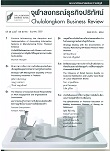ศักยภาพการจัดการความรับผิดชอบต่อสังคมเชิงกลยุทธ์ ของอุตสาหกรรมอาหารแปรรูปในประเทศไทย
Main Article Content
Abstract
บทคัดย่อ
วัตถุประสงค์ของการวิจัยนี้เพื่อศึกษาองค์ประกอบและโมเดลสมการโครงสร้างของศักยภาพการจัดการความรับผิดชอบต่อสังคมเชิงกลยุทธ์ของอุตสาหกรรมอาหารแปรรูปในประเทศไทย ดำเนินการวิจัยเชิงปริมาณโดยส่งแบบสอบถามไปยังผู้บริหารอุตสาหกรรมอาหารแปรรูปในประเทศไทย จำนวน 1,378 ฉบับ ได้รับการตอบกลับ 268 ฉบับ คิดเป็นร้อยละ 20.96 ของอัตราการตอบกลับ ใช้โปรแกรมคอมพิวเตอร์ในการวิเคราะห์องค์ประกอบเชิงยืนยันและสมการโครงสร้าง ผลการวิจัยพบว่า องค์ประกอบของศักยภาพการจัดการความรับผิดชอบต่อสังคมเชิงกลยุทธ์ (Strategic CSR Management Capability; CSC) ประกอบด้วย การสร้างสรรค์ผลิตภัณฑ์สังคม ประสิทธิภาพห่วงโซ่คุณค่าเพื่อสังคม การผสานประโยชน์ชุมชน ความร่วมมือกับเครือข่ายทางสังคม องค์ประกอบการวางแผนวาระทางสังคม (Corporate Social Intensiveness; CSI) ประกอบด้วย การมุ่งเน้นประเด็นทางสังคมอย่างเฉพาะเจาะจง ประสิทธิภาพการจัดสรรทรัพยากร การสนับสนุนจากผู้บริหาร การสร้างการรับรู้ องค์ประกอบของคุณค่าทางเศรษฐกิจที่จับต้องไม่ได้ (Economic Intangible Value; EIV) ประกอบด้วย ภาพลักษณ์ ชื่อเสียง และความน่าเชื่อถือขององค์การ โมเดลสมการโครงสร้างมีความสอดคล้องกับข้อมูลเชิงประจักษ์ (X2 = 179.60, df = 158, p-value = .115, X2/df = 1.137, CFI = .996, RMSEA =.23) และพบว่า CSI มีอิทธิพลโดยตรงต่อ CSC (y = .88, p<.001) และEIV (y = .22, p<.001) และยังมีอิทธิพลโดยอ้อมต่อผลการดำเนินงาน (Business Performance; BP) โดยมี CSC เป็นตัวแปรคั่นกลาง (Mediator) ส่วน EIV ไม่มีอิทธิพลโดยตรงต่อBP นอกจากนี้ยังพบว่า CSC มีอิทธิพลโดยตรงต่อ EIV (ß = .70, p<.001) และ BP (ß = .71, p<.001) โมเดลสามารถอธิบาย CSC และ BP ได้ร้อยละ 77 และ 51 ตามลำดับ สมการโครงสร้างไม่มีความแตกต่างในด้านขนาดของกิจการ และระยะเวลาในการดำเนินงาน งานวิจัยนี้สามารถใช้เป็นแนวทางในการดำเนินงานความรับผิดชอบต่อสังคมของกิจการที่มุ่งหวังให้เกิดคุณค่าร่วมระหว่างกิจการและสังคม
คำสำคัญ: ความรับผิดชอบต่อสังคม; การจัดการเชิงกลยุทธ์; การสร้างคุณค่าร่วม; ผลการดำเนินงานของธุรกิจ
Abstract
The purpose of this research was to study factors and the structural equation modeling (SEM) of the strategic CSR management capability of food processing industry in Thailand. Conducted by quantitative research, using 1,378 questionnaires to an executive of food processing industries and got response amount of 268 participants that is 20.96% of response rate. Used computer programs to analyze the confirmatory factor analysis and SEM. The research found that factors of the strategic CSR management capability (CSC) composed of product social creativeness, value chain efficiency for society, community social synergy, and social network collaboration. The factors of corporate social intensiveness (CSI) are specific social issues focus, resources allocation efficiency, executive support, and perception creation. The factors of economic intangible value (EIV) are corporate social image, corporate social reputation, and corporate social credibility. The SEM of the strategic CSR management capability is consistent with empirical data (X2 =179.60, df = 158, p-value = .115, X2/df = 1.137, CFI = .996, RMSEA = .23). And found that the CSI has a direct influence on both of the CSC (y = .88, p <.001) and the EIV (y = .22, p <. 001). It also has an indirect influence on the performance through the CSC as an intermediate variable. The EIV is not direct influence on the performance. Also found the CSC has a direct influence on the EIV (ß = .70, p <.001) and business performance (ß = .71, p <.001). This model could explain the CSC and performance at 77 and 51 percent respectively. Compared to its size of business and age of the operation found that there were no difference between in each groups. This research can be used as a guide to operation of social responsibility that look forward to the share valuable of business and society.
Keywords: Corporate Social Responsibility; Strategic Management; Shared Value; Business Performance
Article Details
Opinions and discussions in papers published by the Creative Business and Sustainability Journal (CBSJ) are deemed as personal opinions and the responsibility of the writers. They are not the opinions or responsibility of the Chulalongkorn Business School of Chulalongkorn University.
Papers, content, information etc. appearing in the Journal are deemed to be the copyright property of the Chulalongkorn Business School of Chulalongkorn University. Anybody or any organization that wishes to publish any part of them or use them in any way must obtain written permission from the Chulalongkorn Business School, Chulalongkorn University.


